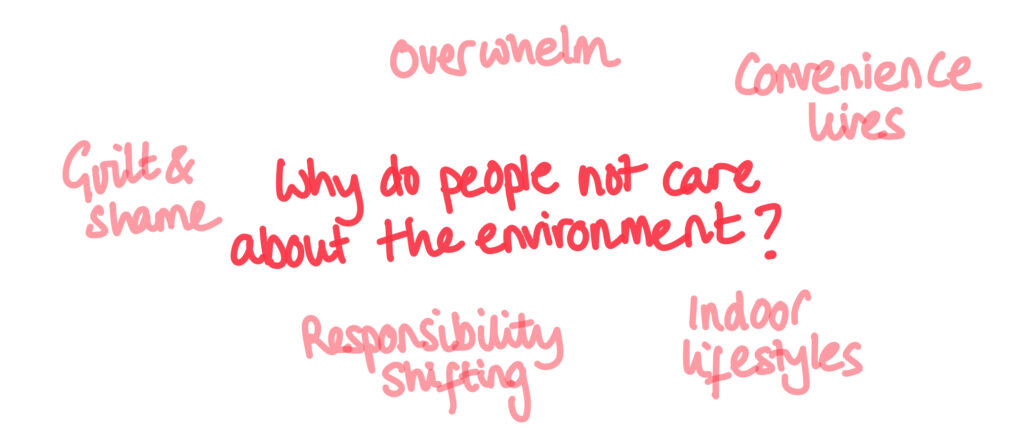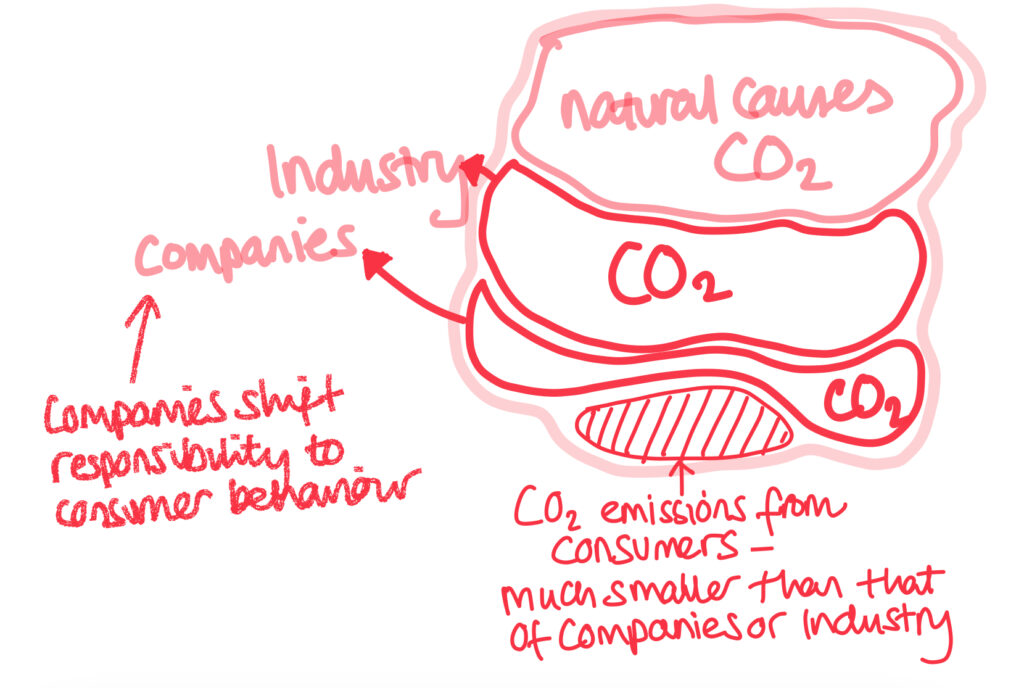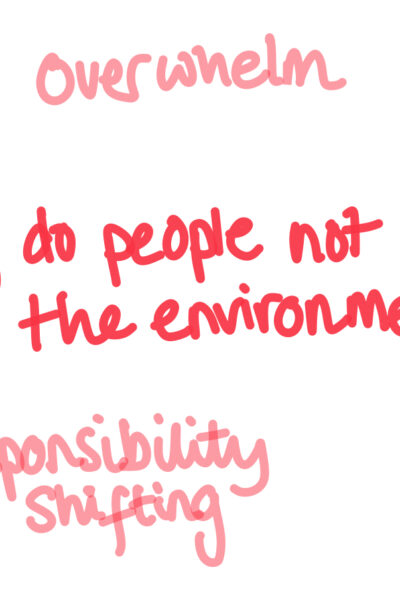Our environments are special but sometimes it feels like no one cares! Why is that?! It can be so infuriating. This post looks at the top 5 reasons that people don’t care about the environment.
Why don’t people care about the environment?
I’ve arranged my ideas into 5 key categories. Here are my top 5 reasons why people don’t care about the environment.
- Convenience
- Overwhelm
- Guilt and shame
- Responsibility shifting
- Indoor and screen lifestyles

1. Convenience
The convenience lives we lead today mean we engage with fewer of the processes around us. In every aspect, life today is so ‘easy’ and ready for us, that the concept of waste and unnecessary consumption is watered down. For example, imagine just considering washing. In the US particularly, you throw clothes in a washer dryer, press a button and get dry clothes out that just need folding and putting away. You are never confronted by the amount of water used, where the water, full of soap powder chemicals goes. You’re not confronted with where the electricity comes from- a significant amount! You don’t have to take each item and hang it out on a line to dry. You don’t have to consider whether it’s sunny enough outside for bed sheets to dry naturally.
In Europe, people more commonly air dry their washing, which is more work, but means they have more stake in the game. Not on family level, but on an overall level, limitations on space and time, might make individuals more likely to get a few wears out of a t-shirt rather than washing unnecessarily. This is a small example; the overall effect is a more careful, thoughtful behaviour when there’s is more work involved.
A similar thing is true for recycling and waste. If it all goes in a big bin and gets collected out the front of your house, like at my parents house in London, it’s easy not to think about how much waste you produce. If you have to personally drive to a recycling centre to dispose separate of bottles, plastics, paper cardboard (as my grandparents in Germany did), you are confronted by it.
2. Overwhelm
The world has so many highly complex interacting systems. They operate in a series of delicate balances. We know so little about the amazing workings of our planet. Which is why, when we hear about the a particular effect on one thing we do, and then another and anther, it feels so overwhelming.
The problem here is two fold. Firstly, the overwhelm; you might feel like ‘oh my god everything I do is bad’, which makes you feel helpless and useless, not empowered. The second problem, is that these sorts of things happen in an ‘after the fact’ way rather than a pre-emptive way. What do I mean by that? You find out something (like using straws) is bad for turtles and have to change your habits to stop doing it. You have to stop what you’ve been doing for years. And the narrative is offensive, it feels like an affront to what we know.
What would stop this being the case, is a more pre-emptive understanding of the causes and end effect of the actions we do. If we knew straws ended up in the ocean, it would be less of a shock to see what happens to the turtles. We’d maybe pre-empt more things and negative news about the effects of how we live would feel less like an affront to our lifestyles. Rather than feeling like ‘aaaah I can’t do anything right’ you might feel like ‘oh yeah, well if trash goes into the oceans, makes sense that it causes disturbance’. If you know that everything you do has a consequence to the natural systems of the world, you might be feel more on top of the potential effects, rather than overwhelmed by them.
3. Guilt and shame
When we ask: Why do people not care about the environment? It implies people don’t care. In fact, many people might care deep down, but supress the feelings because it’s so easy to feel helpless. Many people feel guilt and shame for the lives we live; the first thing our ego does is get defensive. Our egos make us dis-engage. Learning about the impact of humans on the planet and our natural environments can be really distressing. It is hard to think about and much easier to detach from.
4. Greenwash and responsibility shift
A lot of the narrative around responsibility to the environment comes from big corporations who use marketing and media campaigns to send out messages that suit their companies. This means massive oil companies ‘look’ green by sending out propaganda that blames the individual for their high electricity consumption. They shift the psychological burden to consumers rather than taking responsibility. 99% of their profits are literally from mining and burning fossil fuels- and their profits are big.
It is not the consumer.

Carbon dioxide emissions in the UK come from power stations, heavy industry and construction, and a small amount comes from travel. A lot also comes from changes in land use; again; as individuals we have no control over that. We all have carbon footprints by being on earth. But just because we need electricity doesn’t mean that electricity has to come from fossil fuels. The decisions for how we run industry and create electricity are decisions made by governments and big corporations.
While the government are still subsidizing fossil fuels use (they are!) we need pressurise and shift the blame to them rather than take on the psychological burden of the companies putting out the advertising campaigns.
Save electricity and recycle for sure! We all need to do our bit- but we should understand where the actual power in big change lies. Since it’s not with us, we might choose to use our energy differently, not feeling guilt and shame, but protesting and trying to change the narrative that is fed to us.
5. Indoor and screen Lifestyles
To connect with, and therefore understand and appreciate the environment, we need to get outside more and see the natural world. Not hiking every weekend but spending time in our local parks, wildlife gardens and woods. Teaching kids about animals and nature. In Germany they have a much bigger culture around forestry. A family friend is a forest educator for primary school. My uncle trained in later life as a forest educator for adults. He has a wealth of games and activities to do in a forest that are really fun- way more engaging than a walk. There are plenty of websites with ideas.
We need to connect and this is a long process, but it starts small and local. It involves small changes you can make easily.
How can we make people care about the environment?
Mainly, I think we need more appreciation of all the processes behind the ‘convenience lifestyles’ we live. An understanding of the processes will give us an overview so we feel more on top of things and less helpless against all the headlines that tell us we do that are bad for the environment.
For example, once your recycling is collected and taken to the council, where does it go? We used to ship it all to China but they stopped taking it- what now? I once went to a talk at university by a leading expert in carbon emission reduction. She worked in the government in climate change mitigation programs. She tries to find out where her local recycling was going. The council didn’t know; as the garbage collection companies, they said. They didn’t know either; ask the recycling centres; ask the pick-up Lorry drivers; or ask someone else. She reported the state of her investigations to the council, and 6 months later got a reply; we are sorry, we have no idea- we will carry out an inquiry.
Where did the recycling go? Here’s is an article titles ‘the recycling myth– about how little we know about the systems in our world’.
We need to learn about the amazing world and the systems we interact in it with. We need to go outside and just do nothing- sit and watch, don’t distract yourself with chat or music. Walk barefoot where it’s safe.

The 5 main reasons people don’t care about the environment
The five main reasons why people don’t care about the environment are:
- Convenience lifestyle puts us out of touch with all the systems binging our convenience. They give us no concept of conservation and waste.
- We get overwhelmed with the amount of things we do that are bad for the environment. There are constant rules of what we can’t do. If we as a better appreciation for the complexity of the systems around us, we’d be less surprised what everything we do has an effect. It might feel less overwhelming and out of control.
- Guilt and shame. These are very difficult emotions, they zap a lot of energy. They can lead to eco-anxiety and eco-grief and these are hard truths to live with.
- We are made to feel responsible for the destruction of our planet by big companies who greenwash and put the onus of change on the consumer. While we should absolutely recycle and save energy, the power for real change is not with the consumer. It’s hard to not waste energy in guilt. But given how much company spend on these propaganda, blame shifting campaigns, we’d be better off spending that energy in protest.
- Indoor screens and lifestyles. We need to connect with the natural world and slow down and understand more about how we as humans relate to the world around us.
Thank you for reading!
Here are some other posts you might enjoy:

